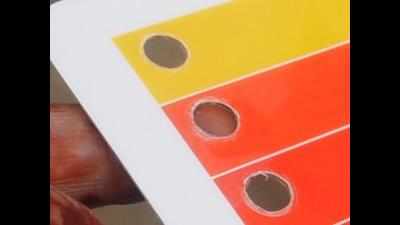- News
- City News
- lucknow News
- UP introduces card test for anaemia detection
Trending
This story is from October 22, 2016
UP introduces card test for anaemia detection

KAKORI: Auxiliary nursing midwife Deepmala was waiting for Santoshi to come and attend the village health and nutrition meet. The worker, by her experience, was sure that Santoshi was anaemic. When the 23 year old arrived, Deepmala opened a small box, took out a fresh prick pin and made Santoshi leave a drop of blood on a card strip. She walked up towards light to match the strip on a shade card and concluded that the woman was a case of borderline anaemia.
A recent addition in the working kit of front line workers, the strip test for anaemia is a World Health Organisation recommended technology introduced in health sector in 2000 but is being used by health workers in UP now under village health and nutrition day activites. Initially doubts were raised about its efficacy but a study of 14 different studies on the subject were reviewed in April 2016. Authors concluded that the test can diagnose anaenia with almost 80% accuracy compared to traditional clinical assesment. Health experts said that the technology can go a long way in reducing UP's maternal mortality. ""Anaemia is responsible premature deliveries, subsequent low birth weight and possibly for inferior neonatal health,"" said Dr Neelam Singh, gynaecologists and health activist.
""It can lead to blood pressure issues at the time of birth which puts the life of the woman in danger. The quality of her life is drastically affected post-pregnancy too,"" she added. Officials at National Health Mission stated that the device was coming very handy in monitoring hemoglobin levels in the last trimester of pregnancy. ""Better monitoring is helping in reinforcement of intake of iron folic acid tablets that have proved useful in improving outcomes. Healthier expecting mothers would mean lesser loss of life and birth of stronger babies,"" they said. Sarla Devi, ASHA trainer for 10 village in Kakori said that device was useful. ""Earlier, a lot of time went in convincing women to get blood test done for anaemia. But now, the test is available near their house and therefore many of them cannot avoid taking it,"" she shared attributing the success to simplicity of the test.
A recent addition in the working kit of front line workers, the strip test for anaemia is a World Health Organisation recommended technology introduced in health sector in 2000 but is being used by health workers in UP now under village health and nutrition day activites. Initially doubts were raised about its efficacy but a study of 14 different studies on the subject were reviewed in April 2016. Authors concluded that the test can diagnose anaenia with almost 80% accuracy compared to traditional clinical assesment. Health experts said that the technology can go a long way in reducing UP's maternal mortality. ""Anaemia is responsible premature deliveries, subsequent low birth weight and possibly for inferior neonatal health,"" said Dr Neelam Singh, gynaecologists and health activist.
""It can lead to blood pressure issues at the time of birth which puts the life of the woman in danger. The quality of her life is drastically affected post-pregnancy too,"" she added. Officials at National Health Mission stated that the device was coming very handy in monitoring hemoglobin levels in the last trimester of pregnancy. ""Better monitoring is helping in reinforcement of intake of iron folic acid tablets that have proved useful in improving outcomes. Healthier expecting mothers would mean lesser loss of life and birth of stronger babies,"" they said. Sarla Devi, ASHA trainer for 10 village in Kakori said that device was useful. ""Earlier, a lot of time went in convincing women to get blood test done for anaemia. But now, the test is available near their house and therefore many of them cannot avoid taking it,"" she shared attributing the success to simplicity of the test.
End of Article
FOLLOW US ON SOCIAL MEDIA











